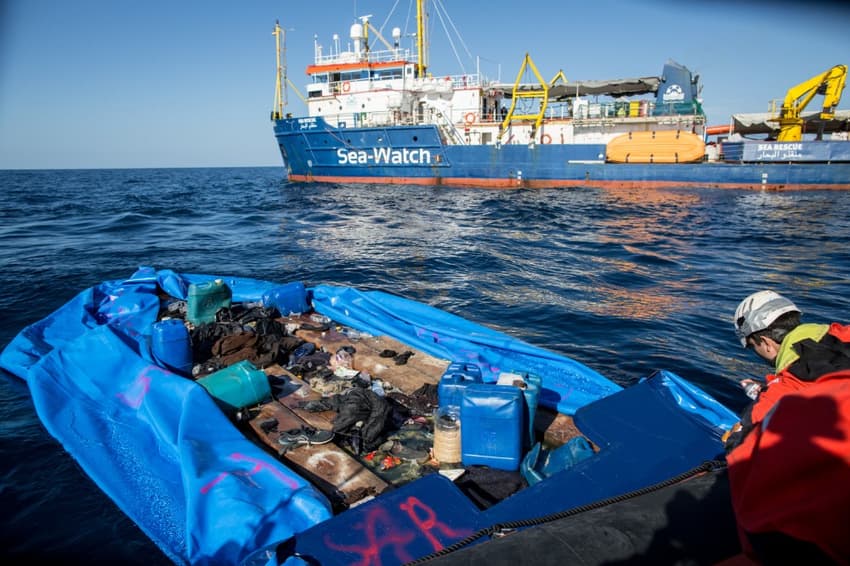Scores of migrants feared missing off Libya: IOM

Scores of migrants were feared missing off the Libyan coast, the IOM said Saturday after the Italian navy flew three survivors to the Mediterranean island of Lampedusa.
The International Organization for Migration said the three, who were suffering from hypothermia, had reported that there were initially 120 people on board their inflatable boat.
That meant "there would be 117 missing, including 10 women and a 10-month-old baby," IOM Italia said in comments posted on Twitter.
Earlier the Italian navy said that three migrants had died and about 15 remained missing, after it staged a rescue operation in the Mediterranean.
The navy intervened on Friday and a helicopter rescued the three people, one plucked from the sea and two from life rafts dropped by an air force plane, Admiral Fabio Agostini said.
Air force pilots had "spotted a dinghy in distress carrying about 20 people," he told Italian television in an interview tweeted by the navy.
"Three corpses were seen floating in the water during the operation," he said, adding that the rescuers had been unable to locate the dinghy.
The IOM said that most of the migrants were from Cameroon, Gambia, Ivory Coast, Nigeria and Sudan.
The three survivors said they had been in the sea for about three hours before help arrived.
The German charity group Sea Watch said Saturday that it had rescued 47 migrants from an inflatable boat, but it was not known if they belonged to the same group.
A Red Crescent spokesman meanwhile said 16 bodies had been found on the beaches of the Libyan city of Sirte between January 2nd and 15th.
According to the IOM, 83 people have died so far this year trying to cross the Mediterranean.
It said the number of migrants and refugees landing on European shores had almost doubled in the first 16 days of this year to 4,216 against 2,365 over the same period in 2018.
UN High Commissioner for Refugees Filippo Grandi said "we cannot turn a blind eye to the high numbers of people dying on Europe's doorstep".
Italy's far-right Interior Minister Matteo Salvini, in a Facebook video, said "the shipwrecks are back in the Mediterranean. The boats are leaving again and we are counting the dead".
But Salvini insisted there was no question of reconsidering his decision to ban access to Italian ports to NGOs, which he accused of playing the people smugglers' game.
READ ALSO: Residents help group of 50 migrants to shore in southern Italy
Comments
See Also
The International Organization for Migration said the three, who were suffering from hypothermia, had reported that there were initially 120 people on board their inflatable boat.
That meant "there would be 117 missing, including 10 women and a 10-month-old baby," IOM Italia said in comments posted on Twitter.
Earlier the Italian navy said that three migrants had died and about 15 remained missing, after it staged a rescue operation in the Mediterranean.
The navy intervened on Friday and a helicopter rescued the three people, one plucked from the sea and two from life rafts dropped by an air force plane, Admiral Fabio Agostini said.
Air force pilots had "spotted a dinghy in distress carrying about 20 people," he told Italian television in an interview tweeted by the navy.
"Three corpses were seen floating in the water during the operation," he said, adding that the rescuers had been unable to locate the dinghy.
The IOM said that most of the migrants were from Cameroon, Gambia, Ivory Coast, Nigeria and Sudan.
The three survivors said they had been in the sea for about three hours before help arrived.
The German charity group Sea Watch said Saturday that it had rescued 47 migrants from an inflatable boat, but it was not known if they belonged to the same group.
A Red Crescent spokesman meanwhile said 16 bodies had been found on the beaches of the Libyan city of Sirte between January 2nd and 15th.
According to the IOM, 83 people have died so far this year trying to cross the Mediterranean.
It said the number of migrants and refugees landing on European shores had almost doubled in the first 16 days of this year to 4,216 against 2,365 over the same period in 2018.
UN High Commissioner for Refugees Filippo Grandi said "we cannot turn a blind eye to the high numbers of people dying on Europe's doorstep".
Italy's far-right Interior Minister Matteo Salvini, in a Facebook video, said "the shipwrecks are back in the Mediterranean. The boats are leaving again and we are counting the dead".
But Salvini insisted there was no question of reconsidering his decision to ban access to Italian ports to NGOs, which he accused of playing the people smugglers' game.
READ ALSO: Residents help group of 50 migrants to shore in southern Italy
Join the conversation in our comments section below. Share your own views and experience and if you have a question or suggestion for our journalists then email us at [email protected].
Please keep comments civil, constructive and on topic – and make sure to read our terms of use before getting involved.
Please log in here to leave a comment.